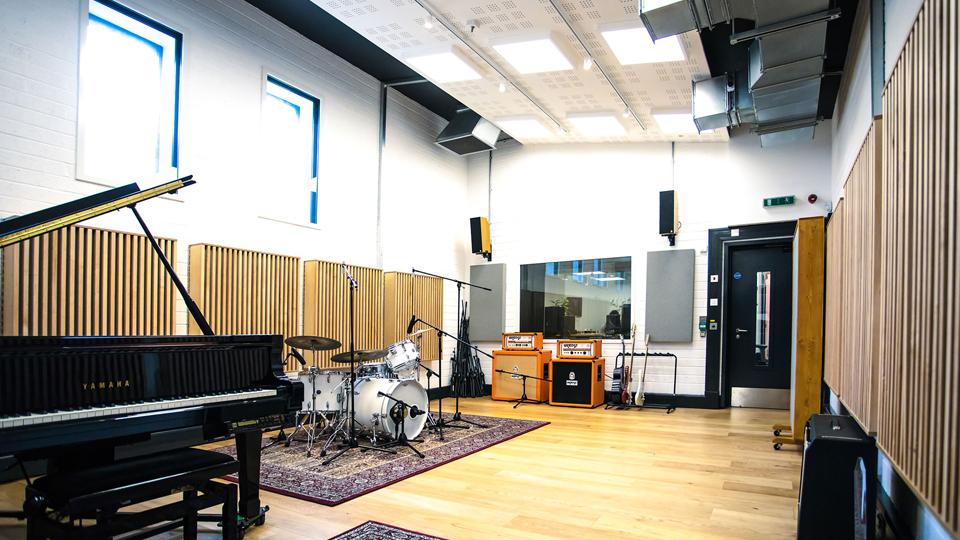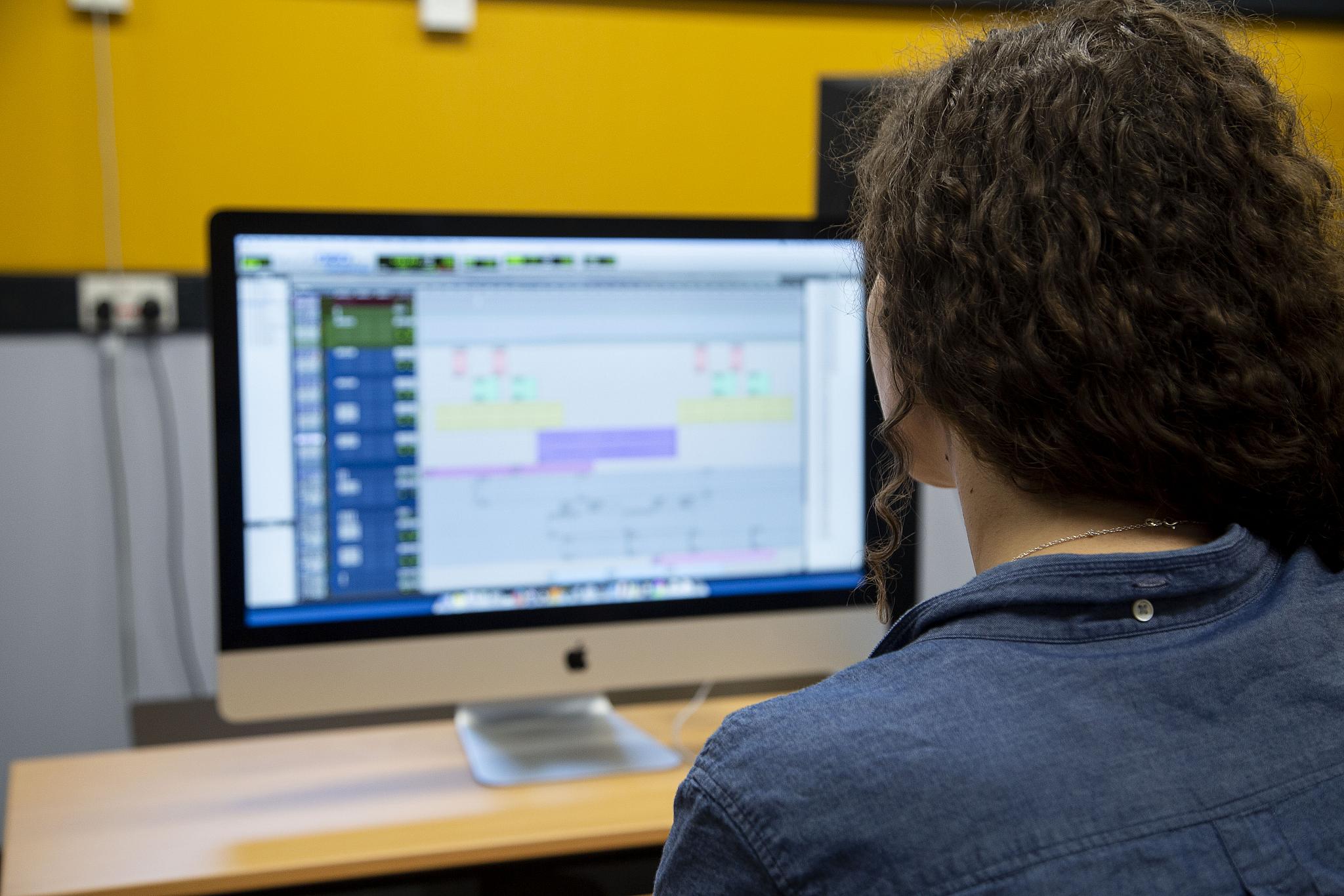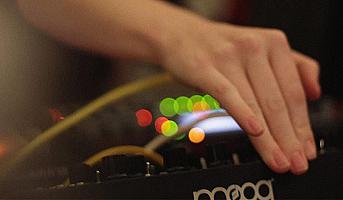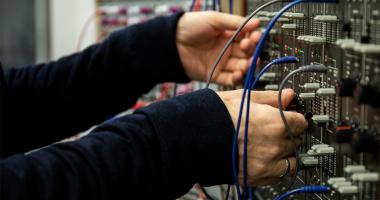MMus
Creative Practice
Content navigation menu
Why study MMus Creative Practice at Goldsmiths
This flexible Masters is an inclusive, forward-thinking composition and creative practice degree, open to broad conceptions of composition, and multi-disciplinary approaches to practice.
- This Masters gives you an opportunity to investigate and combine strategies for developing new creative work.
- You’ll devise a coherent yet bespoke programme of study from an extensive list of options, and have the opportunity to uniquely blend practices from contemporary songwriting and song-based music, sound art, contemporary composition, ethnography and multi-media work.
- Modules on this masters support engagement with a variety of intellectual, creative, critical and technical skills that will inform your work and culminate in a substantial creative project.
- Depending on your module choices, you’ll have access to the Electronic Music Studios, which offers advanced facilities for electro-acoustic composition, multichannel work and live/interactive performance and the Goldsmiths Music Studios which offers an HD Pro-tools recording system and large format analogue desk.
- The programme is exceptionally useful for students preparing for further postgraduate practice research projects, or for those wishing to develop a distinctive portfolio of work for entry into the creative industries.
Contact the department
If you have specific questions about the degree, contact Simon Deacon.
Length
1 year full-time or 2 years part-time
Entry requirements
You should have (or expect to have) an undergraduate degree of at least 2:1 standard in Music or related subject. Your qualification should comprise a substantial relevant practical/creative element. You might also be considered if you can show you have the ability to work at postgraduate level.
Fees
Home - full-time: £10350
Home - part-time: £5175
International - full-time: £19520
Department
What you'll study
Full-time students take the following compulsory modules (choosing between Popular Music Composition and Sonic Arts Practice):
| Module title | Credits |
|---|---|
| Practice Research in Music | 30 credits |
| Popular Music Composition | 30 credits |
| or | |
| Sonic Arts Practice | 30 credits |
| Creative Project | 60 credits |
They then choose modules to the value of 60 credits from an approved list available from the Department of Music. They may take a 30-credit related study module from outside the department. The module must be approved by the pathway leader.
Part-time students
Those studying part-time take Practice Research in Music module and complete the Creative Project. They take optional modules to the value of 90 credits. A module worth 30 credits can be in another department as long as it is approved by the pathway leader.
Note about optional modules (if available): The above is indicative of the typical modules offered, but is not intended to be construed or relied on as a definitive list of what might be available in any given year. The module content and availability is subject to change.
Teaching style
The programme is taught through a mixture of lectures and seminar sessions, tutorials, and where relevant, workshops. You’ll also be expected to undertake a significant amount of independent study.
Support for learning and wellbeing is provided in a number of ways by the Department of Music and College support services, who work collaboratively to ensure you get the right help to reach your best potential both academically and personally.
You will be allocated a Personal Tutor, who has overall responsibility for your individual progress and welfare.
Entry requirements
You should have (or expect to be awarded) an undergraduate degree of at least upper second class standard in Music or a relevant/related subject. Your qualification should comprise a substantial practical/creative element relevant to the selected MMus pathway and option choices. A detailed transcript of your degree is preferred.
You might also be considered for some programmes if you aren’t a graduate or your degree is in an unrelated field, but have relevant experience and can show that you have the ability to work at postgraduate level.
Students who have completed up to 90 credits (not including final 60-credit projects or dissertations) of a comparable degree at another university can apply for recognition of prior learning status as part of their application for a place on the programme, where such credits are carried forward into your study at Goldsmiths.
International qualifications
We accept a wide range of international qualifications. Find out more about the qualifications we accept from around the world.
If English isn’t your first language, you will need an IELTS score (or equivalent English language qualification) of 6.5 with a 6.5 in writing and no element lower than 6.0 to study this programme. If you need assistance with your English language, we offer a range of courses that can help prepare you for postgraduate-level study.
Facilities
As a Goldsmiths music student you will have access to:
You can also use a range of mac labs, rehearsal studios, commercial cinema spaces, and performance spaces.

Goldsmiths Music Studio

Electronic Music Studio
Fees and funding
Annual tuition fees
These are the PG fees for students starting their programme in the 2024/2025 academic year.
- Home - full-time: £10350
- Home - part-time: £5175
- International - full-time: £19520
If your fees are not listed here, please check our postgraduate fees guidance or contact the Fees Office, who can also advise you about how to pay your fees.
It’s not currently possible for international students to study part-time under a student visa. If you think you might be eligible to study part-time while being on another visa type, please contact our Admissions Team for more information.
If you are looking to pay your fees please see our guide to making a payment.
Funding opportunities
BAME Music Scholar's Fee Waiver
This full-tuition fee-waiver scholarship aims to support a BAME student who intends to progress through postgraduate study and into an academic research position.
Sarah Caple Award
Funding to enable students to further their studies or musical development.
Find out more about postgraduate fees and explore funding opportunities. If you're applying for funding, you may be subject to an application deadline.
Additional costs
In addition to your tuition fees, you'll be responsible for any additional costs associated with your course, such as buying stationery and paying for photocopying. You can find out more about what you need to budget for on our study costs page.
There may also be specific additional costs associated with your programme. This can include things like paying for field trips or specialist materials for your assignments. Please check the programme specification for more information.
How to apply
Apply directly to Goldsmiths using our online application system
You apply directly to Goldsmiths using our online application system.
Before submitting your application you’ll need to have:
- Details of your academic qualifications
- The email address of your referee who we can request a reference from, or alternatively a copy of your academic reference
- Copies of your educational transcripts or certificates
- A personal statement – this can either be uploaded as a Word Document or PDF, or completed online. Please see our guidance on writing a postgraduate statement
- A portfolio that provides selected examples of your recent original creative work, (audio, video or other formats as appropriate, four to six separate pieces). These should be provided as links to streamable content (on English Language sites). Examples should be relevant to the focus of the pathway
You'll be able to save your progress at any point and return to your application by logging in using your username/email and password.
When to apply
We accept applications from October for students wanting to start the following September.
We encourage you to complete your application as early as possible, even if you haven't finished your current programme of study. It's very common to be offered a place that is conditional on you achieving a particular qualification.
Late applications will only be considered if there are spaces available.
If you're applying for funding, you may be subject to an earlier application deadline.
Find out more about applying.
Careers
Where your degree can take you
The programme is designed with careful consideration of the opportunities, challenges and intellectual demands presented by music-related careers in journalism, teaching, broadcasting, librarianship and arts administration. It also supports the practice-based professions, for example research through performance and sound recording production.
A high proportion of graduates have progressed to MPhil/PhD at either Goldsmiths or other prestigious universities in the UK or overseas.
Alumni
Graduates specialising in composition and creative practice have achieved performances of their work at internationally established venues, events and festivals, as well as broadcasts on BBC Radio. A number have received prestigious prizes and honourable mentions for their work in competitions including the PRSF New Music Award, the International Competition de Musique et d'Art Sonore Electroacoustiques de Bourges and the International Electroacoustic Competition Musica Viva.
Graduates in performance have successfully pursued international careers in professional performance, taking up positions with established ensembles such as The Australian String Quartet, Tasman String Quartet, Piano Circus, as well as various European orchestras, and undertaking related artist-in-residency and teaching roles.
Bespoke projects
Goldsmiths students make music with EMI
EMI Production Music has published an album of music for film, TV and other media composed by Goldsmiths students.
Goldsmiths: Sounds One is a compilation album of 18 tracks composed by 15 students and graduates from Department of Music postgraduate programmes, including MMus Popular Music, MMus Creative Practice.
This album was the brainchild of Paul Sandell, EMIPM content and distribution manager, and is co-produced by James Ewers, associate music lecturer, and Ian Gardiner, Goldsmiths senior lecturer.
The students and graduates were Pete Wilson, Ged Flood, Matt Kirk, Aleksandra Wozniak, Sydney Bull, Alexander Brown, Valeria Pozzo (aka Naonis Sounds), Robert Aitken, Lamis (Ell) Harper, Thomas Falle, Felix Morgan, Paul Reynolds, Jacob Cheetham, Duncan Silvey and Andrea Caruso.
The collection of tracks spans genres, including traditional piano and string-based classical styles (such as Naonis Sounds and Robert Aitken’s urgent Momentous), world-music tinged soundscapes (eg. Ged Flood and Matt Kirk’s Night Trip), modern ambient acoustic/electronic hybrid textures (Pete Wilson’s Gravitas) and synth and noise-heavy pieces (Jacob Cheetham’s Dronem).





